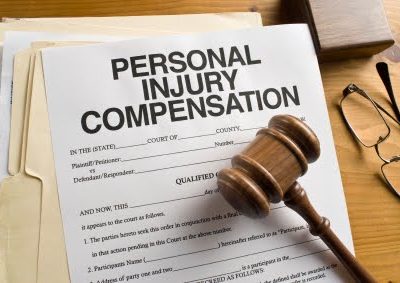 There are a variety of things that you can do to make sure that you are fairly compensated for your losses by protecting your injury claim. Insurance companies and their lawyers have techniques they use to trip up ordinary people in the claims process. Often these techniques rely on the fact that regular people act in regular ways. What regular people don’t understand is that insurance companies will twist reality to keep the money that should be paid for compensation in the company’s bank account. You can protect yourself from these tactics by following some commonsense rules.
There are a variety of things that you can do to make sure that you are fairly compensated for your losses by protecting your injury claim. Insurance companies and their lawyers have techniques they use to trip up ordinary people in the claims process. Often these techniques rely on the fact that regular people act in regular ways. What regular people don’t understand is that insurance companies will twist reality to keep the money that should be paid for compensation in the company’s bank account. You can protect yourself from these tactics by following some commonsense rules.
1. Memory Is Fleeting – Write Things Down
In the period right after a collision things are freshest in your mind. But with each passing day, your memory of the events fades and even changes. Often you might have a driver be apologetic at the scene of an accident and explain he was “in a hurry” or that “running late.” Such admissions can be important in the battle over responsibility if the insurance company decides to blame you for the accident. And, you might be surprised at how often the insurance company will take (or say it takes) a view contrary to your own or even the investigating officer.
We recommend that you write down everything that happened at the scene, including exactly what was said by all drivers. Prepare this document for your lawyer. If you are making the written record for your lawyer you cannot record too much information.
By making this accurate record you can prevent the insurance company and its lawyers from rewriting history
2. Just Explain Your Issues To Your Doctor Don’t Complain.
Your doctor’s office is no place to be a either a whiner or a hero. Nurses, physician’s assistants and therapists are trained to record everything you report and everything else you say related to your condition. Explain the issues you are having, don’t just make passing comments. There should be a note when you tell the provider that the knee pain “Keeps you awake and you can’t sleep” or that “it hurts when you roll over in bed. Or “bending it causes shooting pain”
Medical records often are inaccurate because patients will say something like “I feel pretty good today” or “I feel much better.” Patients like to be able to tell doctors this and doctors like to hear it. It gets written down because that’s what they are in business to do-make you better. But, those types of comments don’t explain the problems they tend to just be filler. And they are used against you. So don’t make off-hand small talk comments about how great you are doing. Report the truth.
The insurance company will see your doctor’s records and these notes are important. What they say is what a jury will believe. If the doctor has to testify he will rely on those notes, not his memory. If the notes are accurate and consistent with your testimony your doctor can be a powerful witness about the struggles you went through after the injuries. But you have to properly and truthfully report the problems during your treatment.
If you medical records are in anyway inaccurate, defense lawyers and insurance companies don’t merely use the inconsistency to challenge the scope of your injury, they challenge whether you are telling the truth about anything.
3. Doctor’s Orders are Orders –Follow Them
The medical records will show exactly what limitations and instructions you were given. If the records show evidence that you did not obey your physician, then the records are used to reduce the value of the claim against the at-fault driver. For example, if the doctor told you to stay off work for a week and you returned in three days, then the insurance company will use that to argue you are responsible for your slow recovery. Similarly, if he prescribed an exercise regimen that you ignored, or referred you to see a specialist or for therapy and you didn’t go then you will be blamed for sny lingering problems.
4. Be Friendly With and Respectful To Your Doctor
Injury cases and claims are generally a hassle for a physician. They view their job as treating people not providing testimony to help you with a liability claim. But, your treating doctor will often be one of the most important witness on your behalf. Generally, if the doctor likes you and believes you followed her guidance, she will be more willing to help you with her testimony. On the other hand, if she found you abrasive or argumentative, her testimony will be nothing more than the reading of his office notes.
5. Keep Those Medical Appointments
You have responsibility to try and get better after an injury. Care providers establish appointments for a reason. Missed appointments are kept in the doctor’s records. They are blemishes on your character and the authenticity of your need for medical treatment. Do everything you can to keep your appointments or call to reschedule.
6. Don’t Exaggerate–Ever
Nothing will sink you injury case faster than false testimony. When a person is caught exaggerating an injury, everything the person says is brought into question. But an injured person is held to the highest standard. For example, suppose the injured individual tells the insurance company or the other attorney that because of his pain he can no longer take automobile trips and has not taken one since the accident. Yet the doctor’s notes reflect that he drove to the Washington Coast over Christmas to spend time with family. The fact that the trip was painful and caused problems won’t matter. What will matter is what is seen as the outright lie.
Lying or exaggerating will doom your case. You have a right to fair compensation but falsely testifying-even accidentally- will reduce that compensation considerably.
7. Take Pictures
Pictures and video matters. It is no surprise that photographs of a badly damaged vehicles makes powerful evidence. Getting such property damage pictures is part of protecting your injury claim. Similarly photos showing an injury can provide persuasive proof of the impacts of the injury. Take lots of pictures throughout your rehabilitation and date them for later use.
photos showing an injury can provide persuasive proof of the impacts of the injury. Take lots of pictures throughout your rehabilitation and date them for later use.
8. Patience Patience
The bad guy’s insurance representative has usually been trained to show you courtesy and feign concern about you. Make no mistake this is just a tactic to minimize your claim. His is an effort to win your confidence and is aimed at one goal: To keep you from retaining legal counsel and thereby be required to pay you all that you are owed.
If you receive a fast offer of payment for your pain, suffering and loss of enjoyment of life do you really think it will be a fair reflection of the real scope of your injuries? Such an offer can be tempting, but you must be patient. The law provides you only get one payment for the injuries that have incurred and may suffer from for the rest of your life.
9. Take Advantage of a Free Case Review And Evaluation
If you or a loved one are injured by the fault of another , you may not need a lawyer to help you finish your claim. But you should avail yourself to a free consultation with a good lawyer to determine your legal rights and remedies. We have discussed many other things people do that hurt their claims in an earlier post.
and remedies. We have discussed many other things people do that hurt their claims in an earlier post.
Call us we can talk over the phone, meet over the internet, at our office or your home, place of work or in hospital if necessary to help you.
We believe in the justice system and want to make sure you get treated fairly in the process of resolving your claim.
Call us from any of Idaho’s cities or towns we are here to help.
|
|
|
|

